-
 Bitcoin
Bitcoin $106,731.2224
-1.05% -
 Ethereum
Ethereum $2,444.9804
-1.20% -
 Tether USDt
Tether USDt $1.0003
0.01% -
 XRP
XRP $2.1882
0.09% -
 BNB
BNB $651.1435
-0.61% -
 Solana
Solana $148.3252
-2.09% -
 USDC
USDC $1.0000
0.01% -
 TRON
TRON $0.2787
0.55% -
 Dogecoin
Dogecoin $0.1598
-3.16% -
 Cardano
Cardano $0.5520
-2.43% -
 Hyperliquid
Hyperliquid $39.0960
-2.64% -
 Bitcoin Cash
Bitcoin Cash $516.9519
2.98% -
 Sui
Sui $2.7011
-2.95% -
 Chainlink
Chainlink $13.0582
-1.71% -
 UNUS SED LEO
UNUS SED LEO $8.9250
-2.53% -
 Stellar
Stellar $0.2359
-0.18% -
 Avalanche
Avalanche $17.3856
-3.73% -
 Toncoin
Toncoin $2.8095
-3.56% -
 Shiba Inu
Shiba Inu $0.0...01121
-1.95% -
 Litecoin
Litecoin $85.2795
-0.85% -
 Hedera
Hedera $0.1471
-2.15% -
 Monero
Monero $319.8004
1.12% -
 Dai
Dai $1.0001
0.01% -
 Ethena USDe
Ethena USDe $1.0001
0.02% -
 Bitget Token
Bitget Token $4.5344
-1.07% -
 Polkadot
Polkadot $3.3224
-2.96% -
 Uniswap
Uniswap $6.9697
-2.75% -
 Aave
Aave $266.1658
-2.25% -
 Pepe
Pepe $0.0...09414
-3.41% -
 Pi
Pi $0.4913
-3.29%
How to choose the right wallet software when generating a Bitcoin wallet address?
Secure Bitcoin storage requires careful wallet selection, prioritizing security features (multi-signature, 2FA), user experience, platform compatibility, and regular software updates; open-source options enhance transparency.
Mar 15, 2025 at 02:30 am
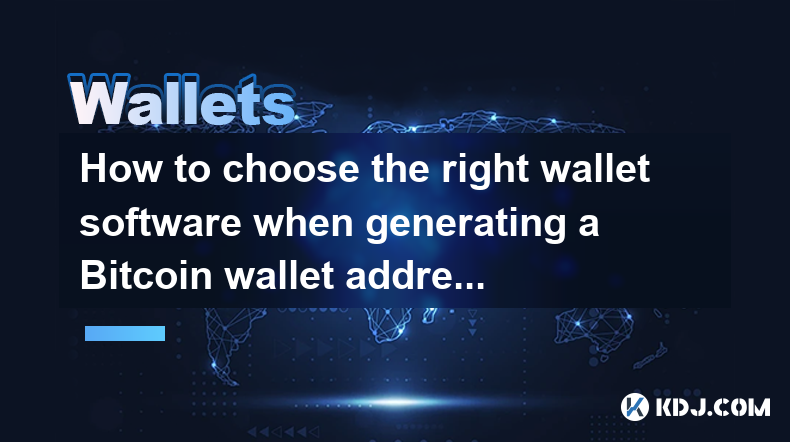
Key Points:
- Understanding different Bitcoin wallet types is crucial for selecting appropriate software.
- Security features like multi-signature, two-factor authentication, and hardware integration are paramount.
- User experience, platform compatibility, and fee structures significantly impact usability.
- Open-source wallets offer transparency and community scrutiny, enhancing trust.
- Regularly updating wallet software is vital for security and feature enhancements.
How to Choose the Right Wallet Software When Generating a Bitcoin Wallet Address?
Choosing the right Bitcoin wallet software is a crucial first step in managing your cryptocurrency. The process involves careful consideration of several factors, ensuring your digital assets remain secure and accessible. The type of wallet you select will directly influence your experience and the level of security afforded to your Bitcoin. Ignoring this critical decision could have serious consequences.
The first consideration is the type of wallet. Hardware wallets, like Ledger or Trezor, offer the highest level of security by storing your private keys offline. Software wallets, on the other hand, are more convenient but require greater vigilance regarding security practices. Software wallets can be further categorized into desktop, mobile, and web wallets, each with its own set of pros and cons. Desktop wallets offer greater control but are vulnerable if your computer is compromised. Mobile wallets provide convenience but are susceptible to mobile device theft or malware. Web wallets, though easily accessible, expose your funds to the security of the hosting platform.
Security should be your top priority. Look for wallets with robust security features. Multi-signature wallets require multiple approvals for transactions, adding an extra layer of protection against unauthorized access. Two-factor authentication (2FA) adds an extra verification step, making it harder for hackers to gain control. Some wallets offer hardware integration, further enhancing security by keeping your private keys offline. Before choosing a wallet, research its security track record and any known vulnerabilities.
User experience is another critical aspect. A user-friendly interface simplifies managing your Bitcoin, even for beginners. Consider factors like ease of navigation, transaction speed, and the clarity of information provided by the wallet software. Some wallets are known for their intuitive designs, while others might be more challenging to use, especially for less tech-savvy individuals. Read reviews and compare the interfaces of different wallets to find one that suits your comfort level.
Platform compatibility is important for seamless access to your funds. Ensure your chosen wallet is compatible with your operating system (Windows, macOS, Linux, iOS, Android) and devices. Some wallets support multiple platforms, providing flexibility, while others are limited to specific environments. Check the wallet's official website for compatibility information to avoid incompatibility issues later.
Transaction fees can vary significantly between different wallet providers. Understand the fee structure before committing to a specific wallet. Some wallets charge flat fees, while others charge a percentage of the transaction amount. High transaction fees can eat into your profits, so comparing fee structures is crucial for budget-conscious users. Transparency in fee calculations is also important; make sure the wallet clearly displays all associated fees before you confirm a transaction.
Open-source wallets offer an added layer of security and transparency. The source code of these wallets is publicly available for review by the community, allowing for independent verification of security and functionality. This open nature can help identify vulnerabilities early on and contribute to a more secure and reliable wallet. However, it requires a degree of technical understanding to interpret the code effectively.
Regular updates are essential for maintaining the security and functionality of your wallet. Wallet developers regularly release updates to patch security vulnerabilities and improve performance. Ensure that your chosen wallet automatically updates or that you manually update it regularly to benefit from the latest security patches and feature enhancements. Outdated software poses a significant security risk, making your Bitcoin vulnerable to attack.
Choosing the right Bitcoin wallet involves a careful balancing act between security, usability, and functionality. Thoroughly research different options, considering your technical skills, security needs, and budget before making a decision. Remember that the security of your Bitcoin depends heavily on the choices you make.
Frequently Asked Questions:
Q: What is a Bitcoin wallet address?
A: A Bitcoin wallet address is a unique identifier, similar to a bank account number, used to receive and send Bitcoin. It's a string of alphanumeric characters generated by your wallet software. Sharing your address allows others to send Bitcoin to you.
Q: Is it safe to use a web wallet?
A: Web wallets offer convenience but present higher security risks than other wallet types because your private keys are stored on a server controlled by a third party. While reputable web wallets employ security measures, they are still vulnerable to hacking and platform failures.
Q: How often should I update my wallet software?
A: You should update your wallet software as soon as updates are available. Security patches are frequently released to address vulnerabilities, and ignoring updates significantly increases your risk of compromise.
Q: What is the difference between a hot wallet and a cold wallet?
A: A hot wallet is connected to the internet, offering convenience but increased vulnerability. A cold wallet (like a hardware wallet) is offline, providing superior security but less convenience.
Q: Can I recover my Bitcoin if I lose my wallet?
A: Recovery depends on the type of wallet and whether you've secured your recovery phrase (seed phrase). This phrase is essential for restoring access to your Bitcoin if you lose your device or wallet software. Without it, recovery is typically impossible.
Disclaimer:info@kdj.com
The information provided is not trading advice. kdj.com does not assume any responsibility for any investments made based on the information provided in this article. Cryptocurrencies are highly volatile and it is highly recommended that you invest with caution after thorough research!
If you believe that the content used on this website infringes your copyright, please contact us immediately (info@kdj.com) and we will delete it promptly.
- Pepeto: The Frog-Themed Meme Coin Set to Outperform in Q3 2025?
- 2025-07-02 05:10:12
- Altcoins, Collaboration, and Trump: A Wild Ride in Crypto
- 2025-07-02 05:10:12
- Tether, Bitcoin, and the Public Listing Frenzy: A New Era for Corporate Crypto?
- 2025-07-02 04:30:12
- SEC, Crypto ETFs, and the Fast Track: A New Era?
- 2025-07-02 05:50:12
- Bitcoin Cash Bullish Breakout: Price Hints at a $1,700 Rally?
- 2025-07-02 05:50:12
- Token Yugijo, Coin Flips & Meme Coins: What's Hot?
- 2025-07-02 04:30:12
Related knowledge
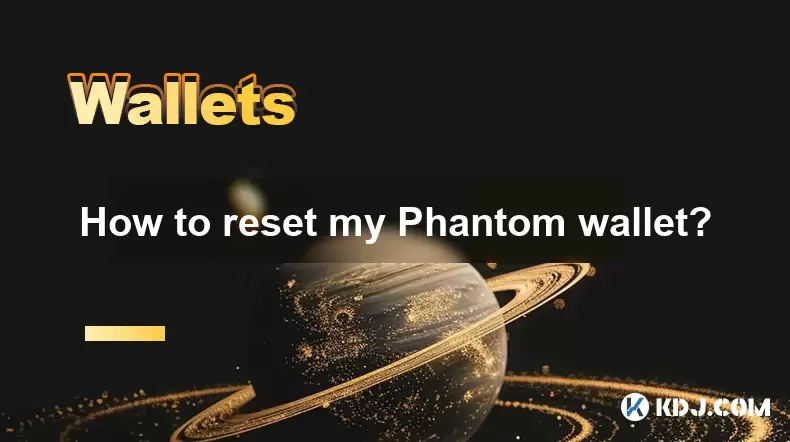
How to reset my Phantom wallet?
Jul 02,2025 at 12:36am
Understanding the Need for Resetting Your Phantom WalletIf you're using a Phantom wallet, you may encounter situations where resetting your wallet becomes necessary. This could be due to forgotten passwords, seed phrase issues, or account corruption. Phantom is a non-custodial wallet primarily used for interacting with the Solana blockchain, and it stor...
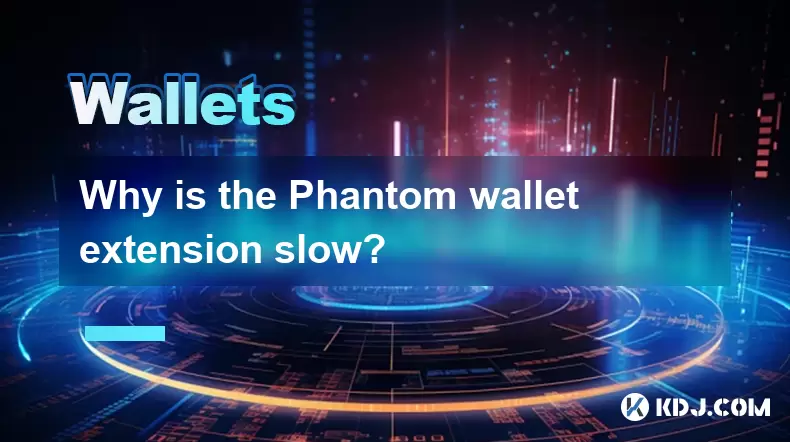
Why is the Phantom wallet extension slow?
Jul 02,2025 at 04:15am
Phantom Wallet Extension: Why Is It Slow?Phantom wallet is a widely used browser extension for interacting with decentralized applications (dApps) on the Solana blockchain. Despite its popularity, some users report that the Phantom wallet extension runs slowly at times. This article delves into potential reasons behind this performance issue and provide...
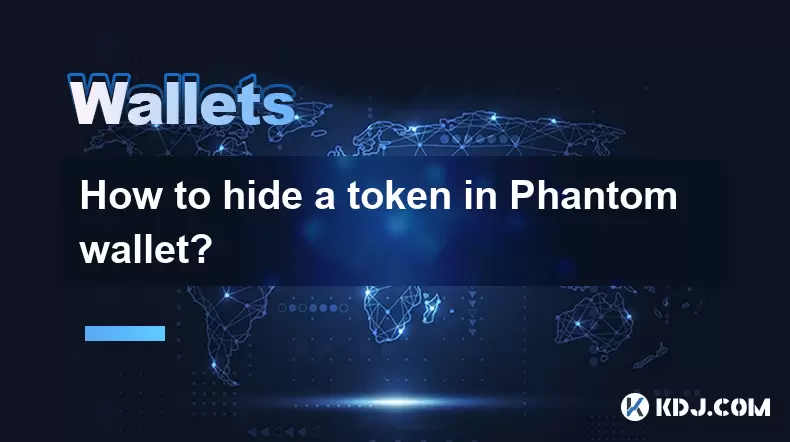
How to hide a token in Phantom wallet?
Jul 01,2025 at 05:49pm
Understanding the Phantom Wallet InterfacePhantom wallet is a popular non-custodial wallet used primarily for interacting with the Solana blockchain. It allows users to store, send, receive, and manage various tokens, including both fungible and non-fungible tokens (NFTs). Before attempting to hide a token, it's essential to understand how the wallet in...
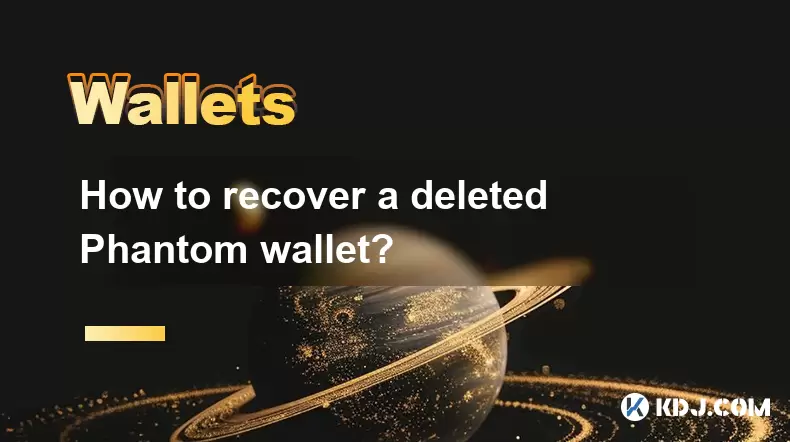
How to recover a deleted Phantom wallet?
Jul 02,2025 at 04:49am
What is a Phantom wallet?Phantom wallet is a popular non-custodial cryptocurrency wallet primarily used for interacting with the Solana blockchain. It allows users to store, send, receive, and manage digital assets like SOL tokens and NFTs. As a browser extension and mobile app, it provides a seamless interface for developers and traders alike. Since it...
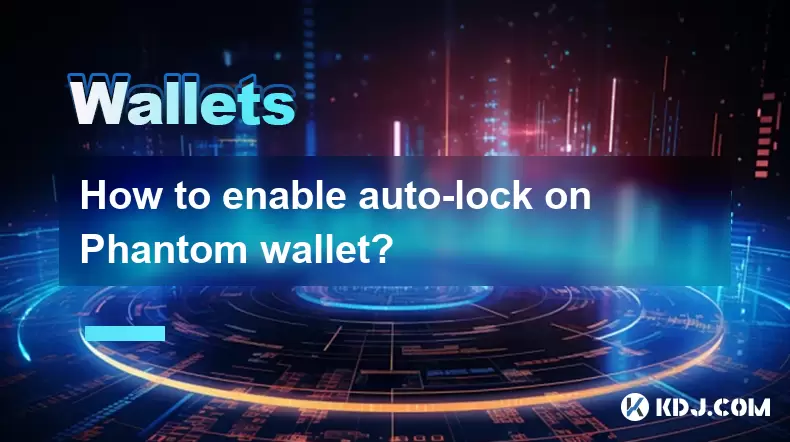
How to enable auto-lock on Phantom wallet?
Jul 01,2025 at 04:01pm
What is Auto-Lock in Phantom Wallet?Phantom wallet is a popular non-custodial cryptocurrency wallet used primarily for interacting with the Solana blockchain. One of its security features includes the ability to set an auto-lock timer, which ensures that the wallet locks itself automatically after a period of inactivity. Auto-lock enhances security by p...
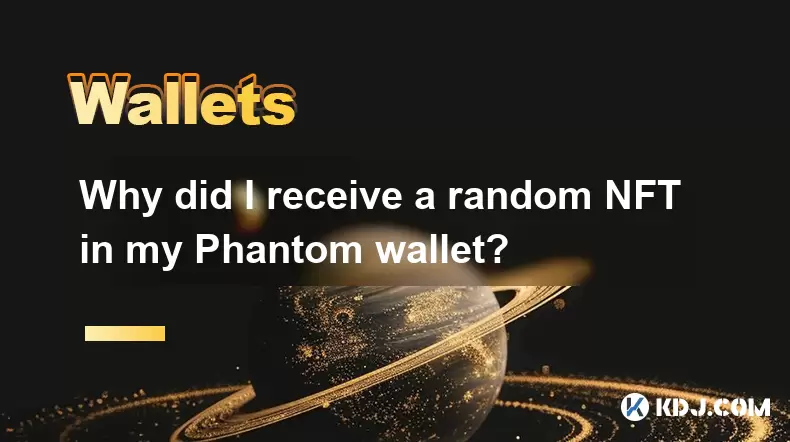
Why did I receive a random NFT in my Phantom wallet?
Jul 01,2025 at 09:00pm
Receiving an Unexpected NFT in Your Phantom WalletIf you've recently opened your Phantom wallet and noticed an unfamiliar NFT appearing in your collection, you're not alone. Many users have reported receiving random or unsolicited non-fungible tokens, often without any prior interaction with the project or sender. This phenomenon has become increasingly...

How to reset my Phantom wallet?
Jul 02,2025 at 12:36am
Understanding the Need for Resetting Your Phantom WalletIf you're using a Phantom wallet, you may encounter situations where resetting your wallet becomes necessary. This could be due to forgotten passwords, seed phrase issues, or account corruption. Phantom is a non-custodial wallet primarily used for interacting with the Solana blockchain, and it stor...

Why is the Phantom wallet extension slow?
Jul 02,2025 at 04:15am
Phantom Wallet Extension: Why Is It Slow?Phantom wallet is a widely used browser extension for interacting with decentralized applications (dApps) on the Solana blockchain. Despite its popularity, some users report that the Phantom wallet extension runs slowly at times. This article delves into potential reasons behind this performance issue and provide...

How to hide a token in Phantom wallet?
Jul 01,2025 at 05:49pm
Understanding the Phantom Wallet InterfacePhantom wallet is a popular non-custodial wallet used primarily for interacting with the Solana blockchain. It allows users to store, send, receive, and manage various tokens, including both fungible and non-fungible tokens (NFTs). Before attempting to hide a token, it's essential to understand how the wallet in...

How to recover a deleted Phantom wallet?
Jul 02,2025 at 04:49am
What is a Phantom wallet?Phantom wallet is a popular non-custodial cryptocurrency wallet primarily used for interacting with the Solana blockchain. It allows users to store, send, receive, and manage digital assets like SOL tokens and NFTs. As a browser extension and mobile app, it provides a seamless interface for developers and traders alike. Since it...

How to enable auto-lock on Phantom wallet?
Jul 01,2025 at 04:01pm
What is Auto-Lock in Phantom Wallet?Phantom wallet is a popular non-custodial cryptocurrency wallet used primarily for interacting with the Solana blockchain. One of its security features includes the ability to set an auto-lock timer, which ensures that the wallet locks itself automatically after a period of inactivity. Auto-lock enhances security by p...

Why did I receive a random NFT in my Phantom wallet?
Jul 01,2025 at 09:00pm
Receiving an Unexpected NFT in Your Phantom WalletIf you've recently opened your Phantom wallet and noticed an unfamiliar NFT appearing in your collection, you're not alone. Many users have reported receiving random or unsolicited non-fungible tokens, often without any prior interaction with the project or sender. This phenomenon has become increasingly...
See all articles

























































































